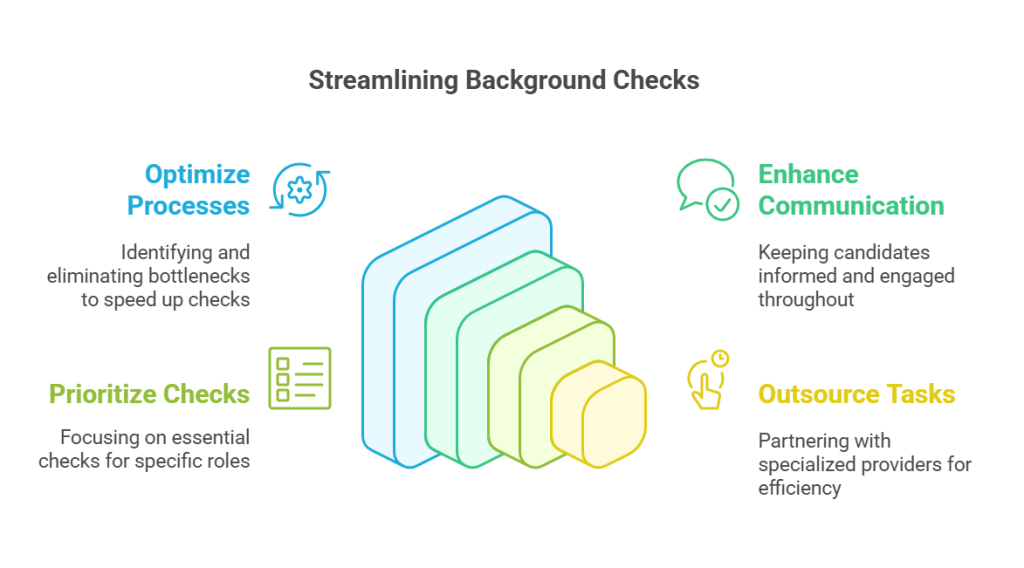In today's fast-paced job market, the speed of background checks can make or break a company's hiring process. As competition for top talent intensifies, employers must balance the need for thorough vetting with the urgency to fill positions quickly. Both thoroughness and speed are crucial in ensuring the right fit for the role while maintaining a smooth candidate experience. For job seekers, long wait times can be frustrating and costly, potentially leading them to accept offers from other companies.
Key Takeaways
- Impact of Delays: Prolonged background checks can lead to candidate drop-offs, harming employer branding and resulting in financial losses due to extended vacancies.
- Candidate Expectations: Modern candidates anticipate swift hiring processes; delays can cause frustration and may lead them to pursue other opportunities.
- Process Optimization: Streamlining background check procedures by identifying bottlenecks and utilizing technology can reduce turnaround times without compromising accuracy.
- Prioritization: Focusing on essential checks relevant to specific roles can expedite the process while maintaining necessary scrutiny.
- Technological Advancements: Implementing AI and machine learning enhances the efficiency and accuracy of background checks, allowing for faster decision-making.
The tension between thoroughness and speed in background checks is more pronounced than ever. Employers need to be diligent to avoid risks, but they also must act swiftly to secure top candidates. This delicate balance impacts the company's reputation and the candidate's decision-making process. This dynamic is essential for employers who want to attract and retain the best talent.
From the candidate's perspective, waiting for background check results can be a deal-breaker. Delays can lead to anxiety and a negative impression of the company. Employers must recognize the candidate's viewpoint and streamline their processes to minimize waiting times. Doing so can improve the hiring experience and enhance the company's image.

The Cost of Lengthy Background Checks
EXPERT INSIGHT: The age-old conundrum: speed versus quality. Traditionally, some would prioritize speed while others would emphasize quality, depending on their priorities. However, in today's fast-paced world, both speed and quality are essential when it comes to background checks. Delayed background checks can lead to postponed start dates, and in this competitive job market, candidates often choose companies that can move faster—where their paycheck arrives sooner. It’s crucial to strike a balance. By adopting efficient and thorough background check processes, we can ensure both timely onboarding and comprehensive vetting. Let’s be practical about it. Dive deeper into this topic in the article. - Emile Garcia, SHRM-SCP, CHRP, CHRBP
Candidate Attrition
Lengthy background checks can lead to significant candidate drop-off rates. Studies show that candidates are more likely to abandon the hiring process if it takes too long. According to the Talent Board's Candidate Experience Research, nearly 60% of candidates have withdrawn from the hiring process because it took too long. Additionally, a report by CareerBuilder found that 43% of job seekers lose interest in a job if they don’t hear back from the employer within two weeks of the initial interview. This attrition can be costly for employers, as they lose out on potentially valuable hires. Moreover, employers may also incur additional costs in re-advertising the position and conducting additional interviews.
Negative Employer Branding
Slow hiring processes can also harm a company's reputation. Candidates often share their experiences with others, and negative reviews can spread quickly through social media and job review sites. Long wait times can show inefficiency and disorganization, deterring future applicants. Building a positive employer brand requires a commitment to a streamlined and efficient hiring process.
The Opportunity Cost
The opportunity cost of lengthy background checks is significant. While top candidates wait, they may receive offers from other companies with faster processes. This means employers risk losing the best talent to competitors who can move more quickly. In a competitive job market, speed can be decisive in securing the best candidates.
Financial Implications
Extended vacancies and prolonged hiring cycles have direct financial implications. Open positions mean lost productivity and increased workload for existing employees. The longer it takes to fill a role, the higher the overtime and temporary staffing costs. Streamlining the background check process can help minimize these costs and improve overall efficiency.
The Modern Candidate's Expectations
The table below presents data on how long prospective U.S. employees were willing to wait for a company to complete its background check process before moving on to another opportunity in 2018, categorized by age group (Statista):
| Characteristic | 18-34 years old | 35-44 years old | 45-54 years old | Over 55 years old |
| 1 week to less than 10 days | 37% | 43% | 42% | 41% |
| 10 days to less than 2 weeks | 23% | 25% | 19% | 21% |
| 2 weeks or more | 21% | 23% | 19% | 17% |
Generational Differences
Different age groups have varying expectations regarding the hiring process. Younger generations, such as Millennials and Gen Z, are accustomed to rapid responses and quick turnarounds in daily interactions. They expect the same speed in the hiring process. A survey by Robert Half found that 79% of Gen Z candidates expect to hear back from potential employers within two weeks of applying. Older generations may be more patient, but overall, the trend is towards expecting faster results. Additionally, 58% of Millennials say they would turn down a job offer if the hiring process was too slow. Employers need to adapt to these expectations to stay competitive.
The "Two-Week Rule"
The "Two-Week Rule" has become a widely accepted benchmark for background check timelines. Candidates expect to hear back within two weeks of their interview or application. Exceeding this timeframe can lead to frustration and disengagement. Setting clear expectations and adhering to this rule can help maintain candidate interest and satisfaction.
Transparency and Communication
Transparency and communication are key to managing candidate expectations. Keeping candidates informed about the status of their background checks can alleviate anxiety and build trust. Despite delays, regular updates show that the company values the candidate's time and is committed to a transparent process. Clear communication can significantly improve the candidate experience.
Strategies for Fast Background Checks

Process Optimization
Optimizing the background check process is essential for reducing turnaround times. Identifying and eliminating bottlenecks can speed up the process. Utilizing technology for data collection and verification can streamline procedures. Standardizing forms and procedures ensures consistency and efficiency. These steps can help create a smoother, faster background check process.
Clear Communication
Setting realistic expectations with candidates upfront is crucial. Providing regular updates on the background check status keeps candidates informed and engaged. Explaining the reasons behind any delays can prevent frustration and maintain trust. Clear communication enhances the candidate experience and strengthens the employer's reputation.
Prioritization
Prioritizing essential checks for specific roles can expedite the process. Not all positions require the same level of scrutiny. Utilizing preliminary screenings to identify red flags quickly can save time and resources. Focusing on the most critical checks allows employers to move more swiftly through the hiring process without compromising thoroughness.
Outsourcing
Partnering with specialized background check providers can significantly speed up the process. These providers have the expertise and resources to conduct thorough checks quickly. Leveraging their services can free up internal resources and ensure a more efficient process. Outsourcing can be a valuable strategy for companies looking to balance thoroughness and speed.
The Future of Fast Background Checks: Embracing Technology
Artificial Intelligence (AI)
In the background check industry, AI streamlines the process by automating data collection and analysis. AI-powered platforms can quickly verify a candidate's educational and employment history, reducing the time required for manual verification. This technology helps identify discrepancies and potential red flags efficiently, ensuring a thorough yet swift process.
Blockchain
The background check industry is leveraging blockchain technology to create secure, verifiable records for employee credentials. Blockchain-based systems allow for tamper-proof storage of background check information, which can be easily and securely shared between employers and verification agencies. This ensures the data remains accurate and unaltered, speeding up the verification process.
Machine Learning
Machine learning algorithms are enhancing the accuracy and efficiency of background checks across the industry. By analyzing patterns and anomalies in data, machine learning models can predict and flag potential risks associated with candidates. This predictive analysis helps in faster decision-making, allowing employers to expedite their hiring process without compromising on the thoroughness of background checks.
Ethical Considerations
As technology advances, ethical considerations become increasingly important. Ensuring fairness and transparency in AI-powered systems is crucial. Protecting candidate privacy and data security must be a top priority. Employers must implement ethical guidelines and practices to maintain trust and integrity in their background check processes.
Frequently Asked Questions
Why are background checks important?
Background checks are crucial for verifying the accuracy of a candidate's information, ensuring workplace safety, and protecting the company's reputation. They help employers make informed hiring decisions by identifying potential risks.
How long should a background check take?
Ideally, a background check should take no more than two weeks. This timeframe aligns with candidate expectations and helps prevent attrition. However, the duration can vary depending on the complexity of the check and the role's requirements.
What can delay a background check?
Delays in background checks can occur due to incomplete or inaccurate information, slow response times from third-party verifiers, or the need for additional verification steps. Employers should promptly communicate any delays to candidates.
How can technology improve background checks?
Technology, such as AI, blockchain, and machine learning, can significantly enhance the speed and accuracy of background checks. These technologies automate data analysis, provide secure records, and improve risk assessment, making the process more efficient.
What are the ethical considerations in using AI for background screening?
When using AI for background checks, it's essential to ensure fairness and transparency. Employers must protect candidate privacy and data security and implement ethical guidelines to maintain trust and integrity in their processes.
Can outsourcing background checks be beneficial?
Yes, outsourcing background checks to specialized providers can expedite the process. These providers have the expertise and resources to conduct thorough checks quickly, allowing employers to focus on other aspects of the hiring process.
How can clear communication improve the background check process?
Clear communication helps manage candidate expectations and reduces anxiety. Regular updates on the background check status and explanations for any delays can improve the candidate experience and build trust.
Conclusion
Fast and thorough background checks are essential in today's competitive job market. Employers must adapt to changing candidate expectations and leverage technology to streamline their processes. By balancing speed and thoroughness, companies can improve their hiring efficiency and enhance the candidate experience. The future of background checks lies in embracing advanced technologies while maintaining ethical standards. Employers prioritizing efficiency and transparency will be better positioned to attract and retain top talent.

